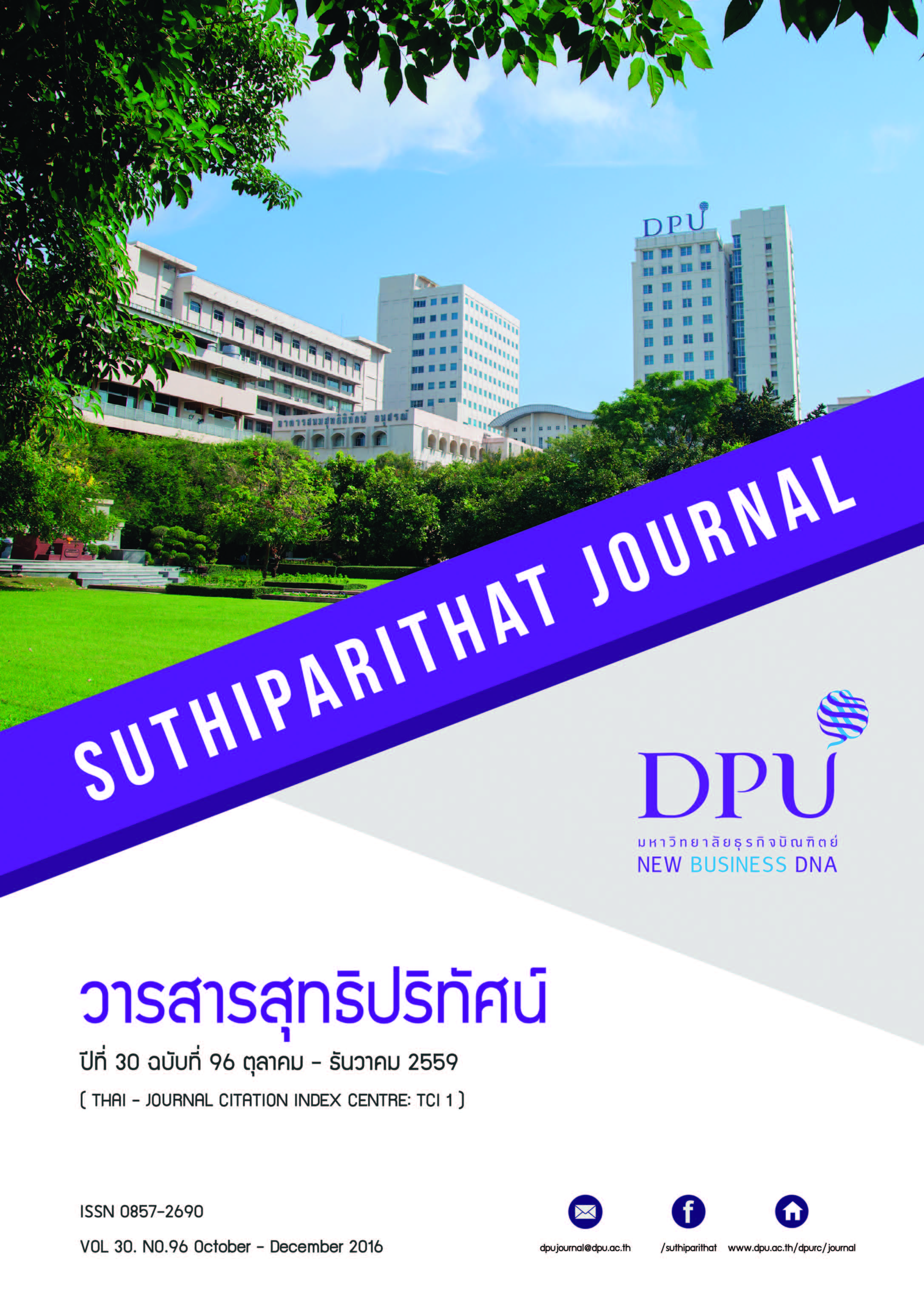โมเดลเชิงสาเหตุของการมีส่วนร่วมในการอนุรักษ์พลังงาน ตามโครงการพลังคิดสะกิดโลก ของโรงเรียนระดับมัธยมศึกษาหรือเทียบเท่าในจังหวัดชลบุรี
คำสำคัญ:
โมเดลเชิงสาเหตุ, การมีส่วนร่วม, การอนุรักษ์พลังงาน, โครงการพลังคิดสะกิดโลกบทคัดย่อ
การวิจัยในครั้งมุ่งศึกษาปัจจัยการมีส่วนร่วมในการอนุรักษ์พลังงาน ตามโครงการพลังคิดสะกิดโลกของโรงเรียนที่ชนะเลิศระดับมัธยมศึกษาหรือเทียบเท่าในจังหวัดชลบุรี รวมถึงพัฒนาโมเดลเชิงสาเหตุ และตรวจสอบความสอดคล้องของโมเดลที่พัฒนาขึ้นกับข้อมูลเชิงประจักษ์ กลุ่มตัวอย่างเป็นผู้บริหาร ครู บุคลากร และนักเรียน ของโรงเรียนอัสสัมชัญศรีราชา ซึ่งได้รับรางวัลชนะเลิศการประกวดตามโครงการ “พลังคิดสะกิดโลก” จำนวน 338 ราย ได้มาโดยการสุ่มตัวอย่างแบบหลายขั้นตอน เครื่องมือที่ใช้เก็บรวบรวมข้อมูล คือแบบสอบถามชนิดมาตรประมาณค่า 5 ระดับ เพื่อใช้วิเคราะโมเดลสมการโครงการ (SEM)
ผลการวิจัยปรากฏว่า ปัจจัยที่มีอิทธิพลต่อพฤติกรรมการตัดสินใจมีส่วนร่วมมากที่สุดคือ ด้านปัจจัย สนับสนุน รองลงมาเป็นปัจจัยผลักดัน และปัจจัยดึงดูด ตามลำดับ จากการวิเคราะห์พบว่า โมเดลที่พัฒนา ขึ้นมีความสอดคล้องเป็นอย่างดีกับข้อมูลเชิงประจักษ์ โดยผลการวิจัยนี้สนับสนุนว่า การเสริมสร้างการมีส่วนร่วมในการอนุรักษ์พลังงานนั้น ควรให้น้ำหนักกับปัจจัยการสนับสนุนมากที่สุด โดยเฉพาะอย่างยิ่ง ด้านความรู้ความสามารถ เนื่องจากมีอิทธิพลโดยตรงและอิทธิพลทางอ้อมต่อการมีส่วนร่วมในการอนุรักษ์พลังงาน ขณะเดียวกันต้องส่งเสริมพัฒนาแรงปัจจัยผลักดัน โดยเฉพาะอย่างยิ่งด้านข้อผูกพันให้มากขึ้น
เอกสารอ้างอิง
Bajunaid, M.A., & Baharun, R. (2013). Toward synthesis model of college students motivation and social and fgtgbvffffhcultural capital: A theoretical perspective. Jurnal Teknologi (Sciences and Engineering), 64(3), 159-165.
Bohman, E. (2014). Attracting the World: Institutional Initiatives’ Effects on International Students’Decision to Enroll. Community College Journal of Research and Practice, 38(8), 710-720.
Cohen, J.M., & Uphoff, N.J. (1980). Effective Behavior in Organizations. New York: Richard D.Irwin Inc.
Glogowska, M., Young, P., & Lockyer, L. (2007). Should I go should I stay? A study of factors Influencing students’ decisions on early leaving. Active Learning in Higher Education, 8(1), 63-77.
Gustafsson, S., Ivner, J., & Palm, J. (2015). Management and stakeholder participation in local strategic energy planning – Examples from Sweden. Journal of Cleaner Production, 98, 205-212.
Havas, L., Ballweg, J., Penna, C., & Race, D. (2015). Power to change: Analysis of household participation in a renewable energy and energy efficiency programme in Central Australia. Energy Policy, 87, 325-333.
Hoicka, C. E., Parker, P., & Andrey, J. (2014). Residential energy efficiency retrofits: How program design affects participation and outcomes. Energy Policy, 65, 594-607.
Lindeman, R.H., Merenda, P.F., & Gold, R.C. (1980). Introduction to bivariate and multivariate analysis. Clenview Illinois: Scott Foresman, Glenview, Ill.
Lv, R. S., & Liu, H. R. (2014). Enterprises’ participation in energy-saving activities’ motivation mechanism model study. Advanced Materials Research, 869-870, 404-407.
Maringe, F., & Carter, S. (2007). International students’ motivations for studying in UK HE: Insights into the choice and decision making of African students. International Journal of Educational Management, 21(6), 459-475.
Metzler, T., & Shea, K. (2011). Lessons learned from a project-based learning approach for teaching new cognitive product development to multidisciplinary student teams. Proceedings of the ASME Design Engineering Technical Conference, 7, 589-598.
Mikami, N. (2015). Public participation in decision-making on energy policy: The case of the “national discussion” after the fukushima accident. Lessons from Fukushima: Japanese Case Studies on Science, Technology and Society, 87-122.
Reeder, W. (1973). Beliefs Disbeliefs and Social Action Department of Rural Sociology Bulletin. New York: University of Missauri.
Richardson, J., & Lenarcic, J. (2009). SMS – Push first and then students will pull administrative information in higher education?. 12th Australian Conference on Knowledge Management and Intelligent Decision Support, ACKMIDS 09 and 20th Australasian Conference on Information Systems, ACIS 2009, 571-581.
ดาวน์โหลด
เผยแพร่แล้ว
รูปแบบการอ้างอิง
ฉบับ
ประเภทบทความ
สัญญาอนุญาต
เนื้อหาและข้อมูลในบทความที่ลงตีพิมพ์ในวารสารสุทธิปริทัศน์ ถือเป็นข้อคิดเห็นและความรับผิดชอบของผู้เขียนบทความโดยตรงซึ่งกองบรรณาธิการวารสาร ไม่จำเป็นต้องเห็นด้วย หรือร่วมรับผิดชอบใด ๆ
บทความ ข้อมูล เนื้อหา รูปภาพ ฯลฯ ที่ได้รับการตีพิมพ์ในวารสารสุทธิปริทัศน์ ถือเป็นลิขสิทธิ์ของวารสารสุทธิปริทัศน์หากบุคคลหรือหน่วยงานใดต้องการนำทั้งหมดหรือส่วนหนึ่งส่วนใดไปเผยแพร่ต่อหรือเพื่อกระทำการใด ๆ จะต้องได้รับอนุญาตเป็นลายลักษณ์อักษรจากวารสารสุทธิปริทัศน์ก่อนเท่านั้น







